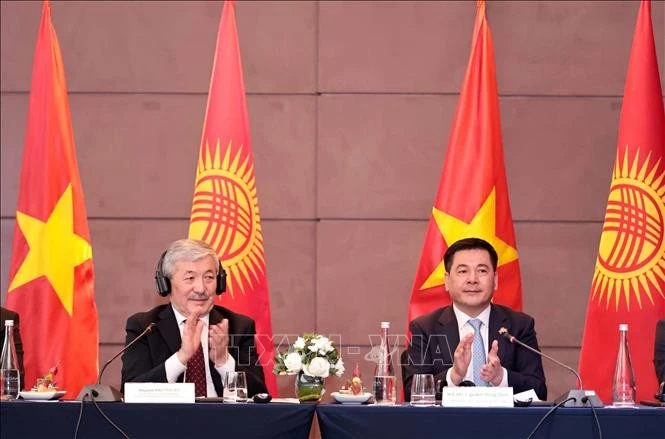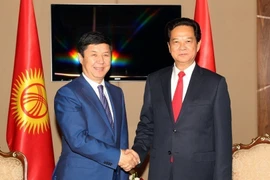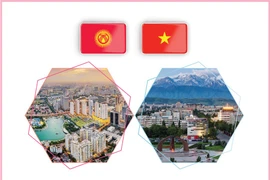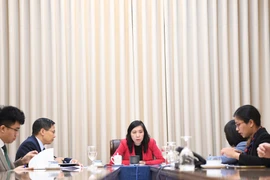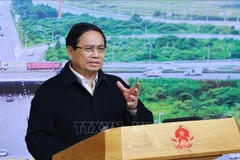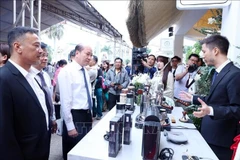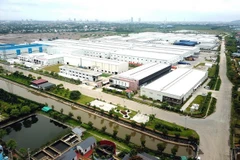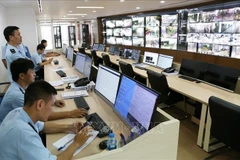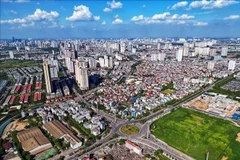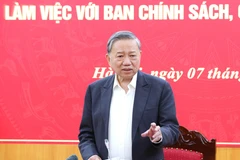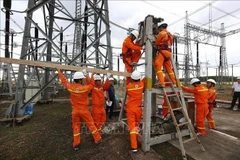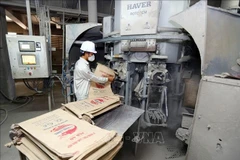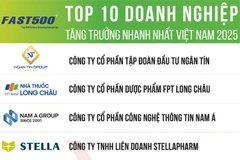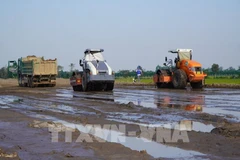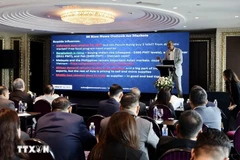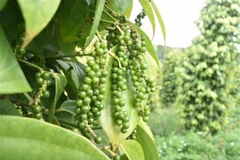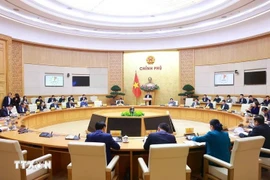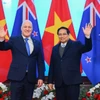Hanoi, March 7 (VNA) – Kyrgyzstan's Prime Minister Adylbek Kasymaliev met with representatives of the Vietnamese business community in Hanoi on March 7 as part of his official visit to Vietnam.
Speaking at the event, PM Kasymaliev said that the meeting represented an important step in strengthening bilateral relations between the two countries in the fields of economy, trade, investment, and energy cooperation.
He said Vietnam and Kyrgyzstan have significant potential to promote collaboration in various promising sectors, such as agriculture, hydro-power, renewable energy, tourism, information technology, and digital economy.
Over the past four years, the multi-faceted reforms implemented by the Kyrgyz government have contributed to the stable development of its economy, with gross domestic product (GDP) growth of about 9%. Currently, Kyrgyzstan is focused on creating a favourable business environment for foreign investors, offering numerous incentives regarding tariffs, export procedures, and administrative processes, thereby opening up many investment cooperation opportunities for foreign businesses, including Vietnamese companies.
The PM said that the cooperative relations between companies of the two countries have been realised through investment projects of Vietnamese businesses in Kyrgyzstan.
PM Kasymaliev said he hopes that following the meeting, economic and investment cooperation between the two countries will flourish, becoming a model relationship. Kyrgyzstan is ready to create favourable conditions for Vietnamese businesses to invest in the country, he emphasised.
Vietnamese Minister of Industry and Trade Nguyen Hong Dien noted that over the past three decades since the two countries re-established official diplomatic relations in 1992, Vietnam and Kyrgyzstan have continued to establish a solid foundation of friendship and mutual understanding, recording many positive developments through close coordination and mutual support at multilateral forums.
Bilateral trade turnover between the two countries has seen positive growth in recent years, about 66-70% annually, especially since 2016 when the free trade agreement between Vietnam and the Eurasian Economic Union (EAEU), of which Kyrgyzstan is a member, took effect.
Notably, in 2024, the bilateral trade turnover reached its highest level ever, increasing by 172%, making Vietnam the largest trading partner of Kyrgyzstan in ASEAN, and conversely, Kyrgyzstan is Vietnam's third-largest trading partner in Central Asia.
On this occasion, Dien congratulated Kyrgyzstan on its economic achievements in recent times, thanks to dynamic and effective policies in harnessing and promoting its natural potential and strategic position as an important transit link in the Asia-Europe corridor.
Many projects in transport, construction, oil refining, cement, and hydro-power have been implemented by Kyrgyzstan, particularly the groundbreaking of a railway connecting China, Kyrgyzstan, and Uzbekistan, with a total length of about 500 km, regarded as an important new Asia-Europe connectivity project in Central Asia.
Additionally, Kyrgyzstan has strengths in resource extraction industries such as non-ferrous metallurgy, uranium, and thorium, and has significant potential in timber processing and renewable energy development.
Currently, Vietnam is boosting its industrialisation and modernisation with focus on developing foundational industries such as mining, mineral processing, and high-tech sectors, including emerging areas like semiconductors, big data, artificial intelligence (AI), the Internet of Things, and cloud computing.
In the energy sector, Vietnam is enhancing structural transformation toward developing renewable energy, re-launching its nuclear power development programme, ensure national energy security, support socio-economic development, and contribute to achieving the goal of net-zero emissions by 2050.
Dien said these are areas where Kyrgyzstan has many advantages and development potential. Therefore, the minister hopes that relevant authorities and businesses of both countries will strengthen cooperation and exchange experiences in these fields./.
